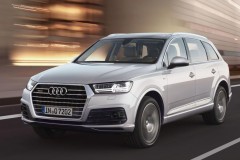Audi Q7 2015 2.0 TFSI quattro
Audi Q7 2015 2.0 petrol description
Audi Q7 2015 2.0 TFSI quattro has been produced from 2015 to 2019. It has four-cylinder petrol engine with displacement of 2.0 litres, which produces power of 250 horsepower on 6000 rpm and torque 370 Nm (Newton metres) on 1600 revolutions per minute.
This 4-cylinder 16-valve engine camshaft is driven by chain (What is an engine chain and belt? ). Engine has fuel injection system and IHI IS20 turbine. The engine meets the Euro 6 emissions standard. Engine lifespan (mileage before major repairs or overhaul) can last from 210 up to 360 thousand kilometres. Remember that engine life depends on regular maintenance and the quality of the materials used (oils, fuels, etc.).
More engine specs
This Audi Q7 2.0 engine oil type is 0W-20 and oil capacity is 5.7 litres.
Audi Q7 2015 2.0 TFSI quattro has all four wheel drive (AWD, 4x4) and automatic gearbox with 8 gears.
Audi Q7 2015 2.0 TFSI quattro accelerates to speed 100 kilometres per hour in 6.9 seconds. The maximum speed of this car is 233 km/h.
Audi Q7 2015 2.0 TFSI quattro fuel consumption is 7.3 litres per 100km in combined city/highway mode (13.7 km/l), fuel consumption in city - 8.8 l/100km, highway fuel economy - 6.5 l/100km. Fuel tank capacity is 85 litres or 22.46 gallons, which gives a mileage up to 1160 kilometers without refueling in urban cycle and even up to 1300 kilometers on highway.
Audi Q7 safety
During safety testing Audi Q7 has obtained 5 stars from five, which means very high safety level.
Adults (driver and passenger) safety of Audi Q7 is evaluated with outstanding rate 94 from 100, children safety: very good mark - 88 from 100, for pedestrian protection Audi Q7 got 70 points from 100.
Audi Q7 safety equipment has been rated as good - 76 percents from 100.

Audi Q7 2015 2.0 TFSI quattro technical data
| Model: | Audi Q7 2.0 TFSI quattro | ||
|---|---|---|---|
| Body style: | Crossover / SUV | ||
| Production period: | 2015. January ... 2019. January | ||
| Engine: | 1984 cm3 Petrol, 4 cylinders | CO2 emissions: | 169 g/km |
| Power: | 250 HP ON 6000 RPM | Torque: | 370 NM ON 1600 RPM |
| Gearbox: | Automatic gearbox (8 gears) | Drive type: | All wheel drive (AWD, 4x4) |
| Top speed: | 233 km/h | Acceleration 0-100 km/h: | 6.9 seconds |
| Fuel consumption (l/100km): | 7.3 (combined) 8.8 (urban) 6.5 (highway) | ||
| Fuel tank capacity: | 85 litres (22.5 gallons) | ||
| Car dimensions: | 5.05m (length) 1.97m (width) 1.74m (height) | ||
| Turning diameter: | 12.4 meters | ||
| Seats: | 7 seats | ||
| Trunk capacity: | 770 litres | ||
| Trunk max capacity: | 1955 litres (with rear seats folded down) | ||
| Gross weight: | 2680 kg | ||
Audi Q7 2015 2.0 TFSI quattro engine CYRB
Engine reliability:
Overall, this engine can last around 210,000 to 360,000 km if properly maintained, using the correct quality oil and fuel, and carrying out regular checks and maintenance.The engine has hydraulic valve tappets (lifters), which provide quieter operation and do not require periodic adjustment, but are more complex in design and can cause serious engine damage in the event of failure.
| Engine displacement | 1984 cm3 |
|---|---|
| Number of cylinders | 4 |
| Bore (cylinder diameter) | 82.5 mm |
| Stroke length (piston move) | 92.8 mm |
| Compression ratio | 9.6 : 1 |
| Camshaft drive | Timing chain Chain motors are considered more reliable, chain replacement usually is required less often than a timing belt, but they are often louder and vibrate more. |
| Fuel system | Injection |
| Audi Q7 2015 2.0 TFSI quattro oil type | 0W-20 |
| Oil capacity | 5.7 litres (6 quarts) |
| Coolant capacity | 10 litres (10.6 quarts) |
| Power | 250 HP ON 6000 RPM |
| Torque | 370 NM ON 1600 RPM |
| Start of production (year) | 2015 |
| Duration of production | 11 years |
Often in the first years of production, engines tend to have various constructive problems, so it is recommended to choose a car with this engine from 2018 onwards. |
|
| Engine also used on | Audi A4 Audi A6 Volkswagen Touareg and 4 other models |
Generally, the use of an engine in several models and its long production run is an indication of the quality of the engine and the success of its design. |
All Audi Q7 crossover [2015 - 2019] modifications
| Modification | Engine | Power | Consumption |
|---|---|---|---|
|
Audi Q7 2015 2.0 TFSI quattro 4x4
Most fuel efficient petrol version |
2.0 Petrol | 252 HP | 7.3 l/100km |
|
Audi Q7 2015 3.0 TFSI quattro 4x4
Most dynamic version - 100 km/h in 6.1 seconds |
3.0 Petrol | 333 HP | 8.1 l/100km |
|
Audi Q7 2015 3.0 TDI quattro 218 Hp 4x4
Most fuel efficient diesel version |
3.0 Diesel | 218 HP | 5.5 l/100km |
| Audi Q7 2015 3.0 TDI quattro 249 Hp 4x4 | 3.0 Diesel | 249 HP | 6.3 l/100km |
|
Audi Q7 2015 3.0 TDI quattro 272 Hp 4x4
Most powerfull diesel version (272 HP) |
3.0 Diesel | 272 HP | 6.1 l/100km |
